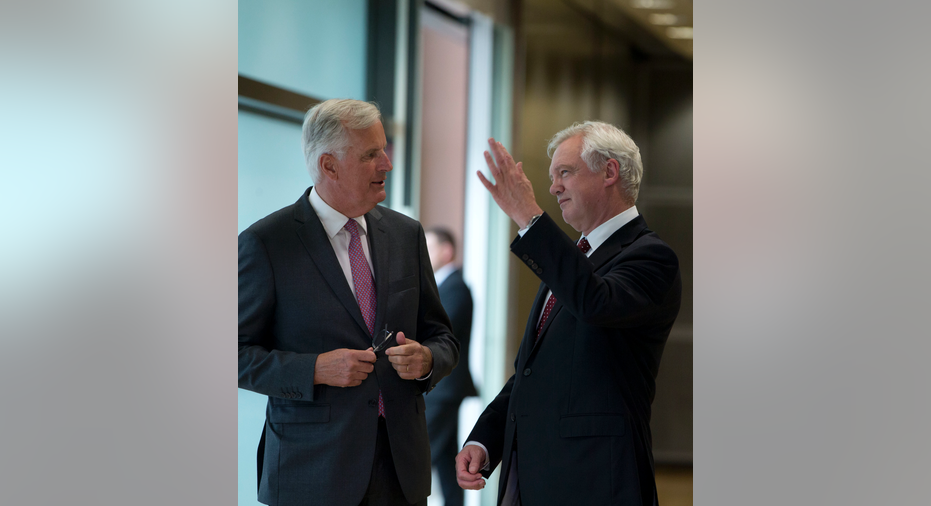The Latest: UK Brexit chief wants action on all exit issues

BRUSSELS – The Latest on the Brexit talks on Britain's departure from the European Union (all times local):
5:25 p.m.
British Brexit negotiator David Davis says the four days of Brexit negotiations this week will have to drive forward "all the issues" instead of just centering on the divorce proceedings that the EU wants to focus on.
Britain wants to determine a future trade relationship with the bloc in lockstep with obtaining an orderly separation from it. The EU, however, wants to have "sufficient progress" on a clear divorce first with Britain before looking at a future relationship.
Davis says "we want to lock in the points where we agree, unpick the areas where we disagree, and make further progress on the whole range of issues." He says the goal remains the same, a deal in the best interests of both sides and business in the UK and Europe.
___
5:10 p.m.
The European Union says the Brexit negotiations are advancing too slowly because there is still not enough clarity on the British side on how the divorce proceedings should proceed.
EU negotiator Michel Barnier says Monday, at the start of a third round of Brexit talks with British officials, that he was concerned "time is passing quickly." He noted the lack of progress in the talks almost five months after the 2-year negotiating period for Britain to leave the EU began in March.
Speaking in Brussels, Barnier says "I am ready to intensify negotiations." He insists he wants British positions on Brexit topics that are clear and without ambiguity.
___
4 p.m.
The European Union and Britain are starting a third round of Brexit negotiations, with London looking to move discussions to the future relationship and Brussels demanding more clarity on the terms of the divorce first.
Almost five months after the two-year divorce process began, the Brexit discussions have made little headway, interrupted by a British general election as well as summer vacations. As things stand, Britain has little idea what relationship it will have with the other 27 countries of the EU past the Brexit date of March 2019.
On the EU side, the frustration is increasingly evident. On Monday, Germany's main business lobby group criticized the British government for what it called an unclear stance on the future. The head of the Federation of German Industries — an influential group in the EU's biggest economy — said "appreciable progress can hardly be expected" during four days of talks this week.
Dieter Kempf says British proposals on customs arrangements after the U.K. leaves are impractical for companies.
__
2 p.m.
The European Union has insisted that key issues of Britain's withdrawal from the bloc must be dealt with before any post-Brexit discussions can begin. Britain is hoping those discussions can begin as soon as October.
The bloc says that is impossible until there has been "sufficient progress" in agreeing terms of the divorce, including how much Britain must pay to settle its existing commitments to the EU.
Britain's Brexit minister, David Davis, acknowledged that this week's Brexit talks will be mainly technical, but urged EU negotiators to show "flexibility and imagination." The talks begin Monday.
Davis says "we want to lock in the points where we agree, unpick the areas where we disagree, and make further progress on a range of issues.
___
Geir Moulson contributed from Berlin. Lawless wrote from London.



















